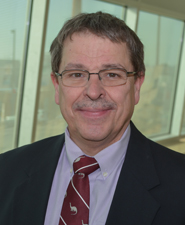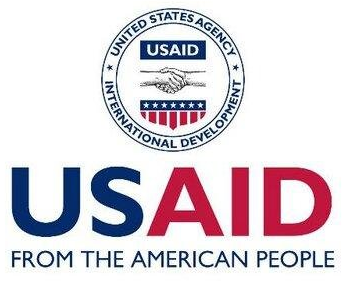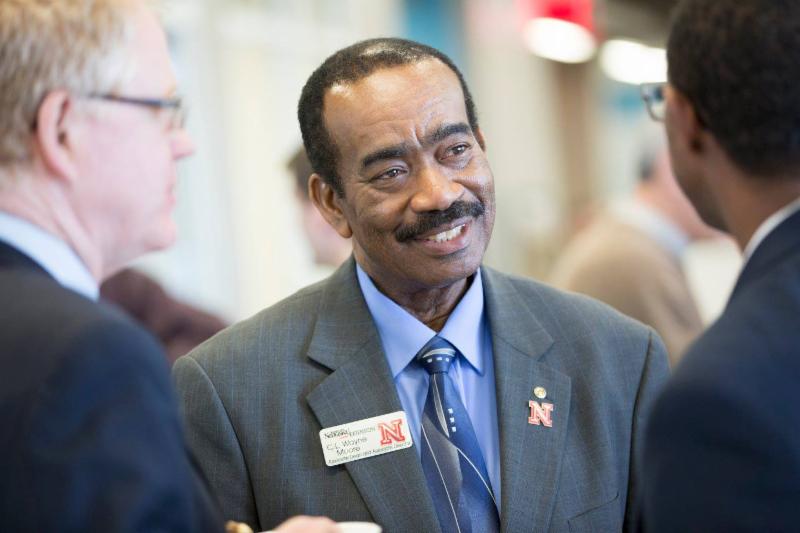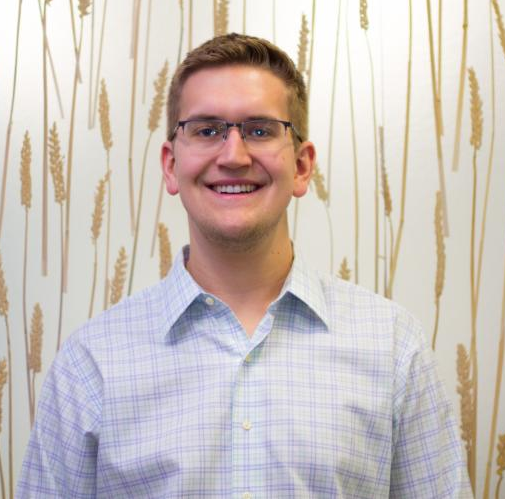|
|
|
|
 |
 |
 |
 |
 |
 |
 |
 |
 |
 |
Daugherty Water for Food Institute partners with ConjoStudios on drought documentary
|
The Robert B. Daugherty Water for Food Institute at the University of Nebraska is pleased to announce its partnership with award-winning filmmaker Conrad Weaver of ConjoStudios to produce
"Thirsty Land," a new documentary that will share the impact of drought on agriculture production throughout the U.S. and its impact globally.
DWFI, along with UNL's Institute of Agriculture and Natural Resources, have provided startup sponsorship funds for the project. It is expected to premier in Lincoln in conjunction with the seventh Water for Food Global Conference in late April 2016.
Learn more.
| Water for Food Partners with "Thirsty Land" |
|
Water Symposium and Water Law Conference March 19-20
|
'Transdisciplinary Conversations' to be held March 16 at UNO
|
 The next
'Transdisciplinary Conversations' gathering, hosted by DWFI and the Rural Futures Institute, will be March 16 from 5-6:30 p.m. at the Barbara Weitz Community Engagement Center on the University of Nebraska-Omaha campus. This month's event will feature a brief talk by Alan Kolok (pictured), director of UNO's Nebraska Watershed Network and interim director of UNMC's Center for Environmental Health and Toxicology. His talk is titled, "Interdisciplinary solutions for super wicked problems: Lessons learned from global climate change." Light food and drinks will be served.
Register now.
|
Celebrating World Water Day 2015
|
 World Water Day
World Water Day is celebrated each year on March 22. Leading up to the day, we encourage you to follow us on Facebook and Twitter and to add your voice to UN-Water's #WaterIs social media campaign by sharing a "selfie" explaining what water means to you.
Download template.
In conjunction with WWD, Dr. Roberto Lenton will serve as a panelist for the World Water Council event, "Water Security: A Pathway to Sustainable Development," on March 20 in Washington, DC. The panel will focus on adapting to climate change.
|
Water for Food faculty advisory panel to convene March 23
|
DWFI's new faculty advisory panel will meet March 23.
The panel will provide guidance to the institute's leadership team on issues of importance to University of Nebraska faculty, including DWFI planning and programming and how they relate to faculty needs. Panel members include:
- Tala Awada, professor, School of Natural Resources and interim associate dean for the Agricultural Research Division, UNL
- Kenneth Cassman, professor, Dept. of Agronomy and Horticulture, UNL
- Dean Eisenhauer, professor, Dept. of Biological Systems Engineering and School of Natural Resources, UNL
- Lilyan Fulginiti, professor, Dept. of Agricultural Economics, UNL
- Alan Kolok, director of UNO's Nebraska Watershed Network and interim director of UNMC's Center for Environmental Health and Toxicology.
- Peter Longo, professor, Dept. of Political Science, UNK
- Bob Oglesby, professor, School of Natural Resources and Dept. of Earth & Atmospheric Sciences, UNL
- Pinaki Panigrahi, professor, Dept. of Epidemiology and Pediatrics and director of the Center for Global Health and Development, UNMC
- Sandra Zellmer, professor, Nebraska College of Law, UNL
|
 A team of researchers representing the U.S. Agency for International Development met with UNL faculty throughout the day on March 10 regarding drought monitoring, water management and food security. DWFI hosted a luncheon for the visitors to discuss ongoing projects and potential collaborations. The visitors included:
- John Wilson, director, Office of Technical Services for Middle East and Asia, USAID
- Kamal Ouda, AAAS Science and Technology Policy Fellow, USAID
- Shahid Habib, chief, Office of Applied Sciences, NASA Goddard Space Flight Center
- Rachael McDonnell, water governance and policy scientist, International Center for Biosaline Agriculture
|
DWFI and NWC Open House a great success
|
 Over 100 friends and colleagues attended the DWFI and NWC open house March 5 at the Nebraska Innovation Campus. It was a pleasure to host the celebration and showcase our new "home." Thank you again to all those who attended. If you were not able to attend and would like to arrange a visit, please e-mail
[email protected].
View photos from the event.
|
|
|
|
|
|
UNL Dept. of Agronomy & Horticulture seminar: Global Food Futures Through to 2050 and the Role of R&D
Philip G. Pardey
March 20, 3:30 p.m.
Cottonwood Room, UNL East Campus Union
Dr. Pardey, professor of applied economics, director of Global Research Strategy and director of International Science and Technology Practice and Policy Center at the University of Minnesota, will present the results of a new approach to assessing the production, consumption and land-use prospects for global agriculture over the coming decades, highlighting the likely consequences of recent changes in the global landscape for food and agricultural R&D.
Learn more.
(Photo: P. Welmer/Flickr)
|
|
|
|

|
Heuermann Lecture: 2050: Agriculture's Role in Mitigating Global Challenges
Robb Fraley
April 21, 3:30 p.m.
Nebraska Innovation Campus
A distinguished leader in agricultural technology, Dr. Fraley is executive vice president and chief technology officer of Monsanto Co. He leads Monsanto's global technology division, which has plant breeding, biotechnology and crop protection research facilities in dozens of countries. He has been involved in agricultural research since the early 1980s and has been with Monsanto for more than 30 years. In 2013, Fraley was honored as a World Food Prize Laureate. This event will be live-streamed.
Learn more.
(Photo: N. Palmer, CIAT)
|
April 8, 3:30 p.m.
Hardin Hall, UNL
Ryan Chapman, wellhead coordinator for the Nebraska Department of Environmental Quality, will present, "Nitrates in Nebraska Groundwater and a Small Town's Plight to Avoid Treatment."
Learn more.
April 22, 3:30 p.m.
Hardin Hall, UNL
T. Prabhakar Clement, Harold Vince Groome Jr. Endowed Professor in the Department of Civil Engineering at Auburn University, will address developing modeling methods and tools for predicting reactive transport processes in porous media under multiple scales.
Learn more.
|
|
 Alex Bruening, a native of Omaha, is working toward a bachelor's degree in mechanical engineering with a minor in energy sciences from the UNL. He expects to graduate in Dec. 2016 and plans to continue on to law school. At DWFI, Alex is creating a statistical database on global irrigation and agriculture. Specifically, this database will contain information on quantity of irrigated land, crops produced, crop yields, irrigation type, water usage and more around the world.
Alex hopes his experience at DWFI will help him gain a better understanding of current and future agricultural production and sustainability around the world, and further his goal to have a career involved in sustainability issues. He is honored to be a part of a team that wants to make a difference.
|
|
|
Water funding opportunities
|
 Securing Water for Food Launches 3rd Call for Innovations
Securing Water for Food Launches 3rd Call for Innovations
Application deadline: May 22 at 5pm EST.
Award amount: Up to 30 innovators are expected to receive between $100,000 and $3 million in funding and acceleration support.
On March 9,
Securing Water for Food: A Grand Challenge for Development launched its third call for game changing innovations to increase water availability and promote efficient use of water in agriculture. Between 2000 and 2050, water demand is projected to globally increase by 55%, as the world's population grows from almost 7 billion to over 9 billion. More than 70% of global water use occurs in the food value chain, which will make making food and water security a pivotal issues in the coming years.
The Challenge aims to source and accelerate innovations in the following areas: water efficiency and reuse, water capture and storage, and salinity and salt water intrusion. This newest round places an increased focus on cutting-edge, advanced technologies and business models, as well as innovations that engage women. Securing Water for Food seeks exceptional initiatives that have already demonstrated success during pilots that go beyond traditional development programs and conventional approaches.
In its inaugural round, Securing Water for Food selected 17 winners out of 520 applications from universities, start-ups, and NGOs in more than 93 countries.
The Securing Water for Food partnership, launched in 2013, includes the U.S. Agency for International Development (USAID), Sweden's development agency (Sida), and the Ministry of Foreign Affairs of the Kingdom of The Netherlands (MFA-NL). As part of USAID's new Middle East Water Security Initiative, an additional $2.5 million will be available for innovations implemented in the MENA region.
Read press release.
|
Additional funding opportunities may be found at
grants.gov, a single access point for individuals to search competitive funding opportunities from more than 900 grant programs offered by the 26 federal grant-making agencies.
|
The Robert B. Daugherty Water for Food Institute at the University of Nebraska was founded in 2010 to address the global challenge of achieving food security with less stress on water resources through improved water management in agricultural and food systems. We are committed to ensuring a water and food secure world while sustaining the use of water for other human and environmental needs.
|
|
|
|
 |
 |
 |
 |
 |
 |
 |
 |
 |
 |
|
| |
|
|